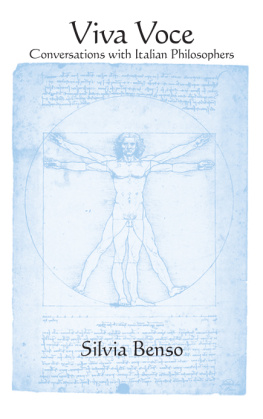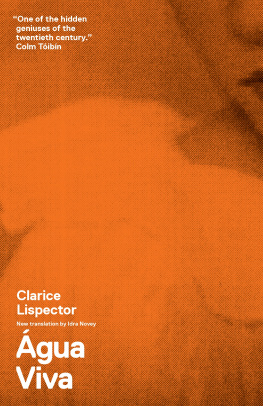Benso - Viva voce: conversations with Italian philosophers
Here you can read online Benso - Viva voce: conversations with Italian philosophers full text of the book (entire story) in english for free. Download pdf and epub, get meaning, cover and reviews about this ebook. City: New York;Italien, year: 2017, publisher: State University of New York Press, genre: Religion. Description of the work, (preface) as well as reviews are available. Best literature library LitArk.com created for fans of good reading and offers a wide selection of genres:
Romance novel
Science fiction
Adventure
Detective
Science
History
Home and family
Prose
Art
Politics
Computer
Non-fiction
Religion
Business
Children
Humor
Choose a favorite category and find really read worthwhile books. Enjoy immersion in the world of imagination, feel the emotions of the characters or learn something new for yourself, make an fascinating discovery.
Viva voce: conversations with Italian philosophers: summary, description and annotation
We offer to read an annotation, description, summary or preface (depends on what the author of the book "Viva voce: conversations with Italian philosophers" wrote himself). If you haven't found the necessary information about the book — write in the comments, we will try to find it.
Benso: author's other books
Who wrote Viva voce: conversations with Italian philosophers? Find out the surname, the name of the author of the book and a list of all author's works by series.
Viva voce: conversations with Italian philosophers — read online for free the complete book (whole text) full work
Below is the text of the book, divided by pages. System saving the place of the last page read, allows you to conveniently read the book "Viva voce: conversations with Italian philosophers" online for free, without having to search again every time where you left off. Put a bookmark, and you can go to the page where you finished reading at any time.
Font size:
Interval:
Bookmark:

Viva Voce
SUNY series in Contemporary Italian Philosophy
Silvia Benso and Brian Schroeder, editors
Viva Voce
Conversations with Italian Philosophers
Silvia Benso

Published by State University of New York Press, Albany
2017 State University of New York
All rights reserved
Printed in the United States of America
No part of this book may be used or reproduced in any manner whatsoever without written permission. No part of this book may be stored in a retrieval system or transmitted in any form or by any means including electronic, electrostatic, magnetic tape, mechanical, photocopying, recording, or otherwise without the prior permission in writing of the publisher.
For information, contact State University of New York Press, Albany, NY
www.sunypress.edu
Production, Ryan Morris
Marketing, Kate R. Seburyamo
Library of Congress Cataloging-in-Publication Data
Names: Benso, Silvia, interviewer.
Title: Viva voce : conversations with Italian philosophers / [interviews by] Silvia Benso.
Description: Albany, NY : State University of New York, 2017. | Series: SUNY series in contemporary Italian philosophy | Translations from Italian. | Includes bibliographical references and index.
Identifiers: LCCN 2016031444 (print) | LCCN 2017000563 (ebook) | ISBN 9781438463797 (hardcover : alk. paper) | ISBN 9781438463803 (ebook)
Subjects: LCSH: Philosophy, Italian. | PhilosophersItalyInterviews. | Philosophy, Modern.
Classification: LCC B3551 .V58 2017 (print) | LCC B3551 (ebook) | DDC 195dc23
LC record available at https://lccn.loc.gov/2016031444
10 9 8 7 6 5 4 3 2 1
A Conversation with Remo Bodei
A Conversation with Eugenio Lecaldano
A Conversation with Salvatore Natoli
A Conversation with Carlo Sini
A Conversation with Carmelo Vigna
A Conversation with Adriana Cavarero
A Conversation with Giacomo Marramao
A Conversation with Fulvio Tessitore
A Conversation with Gianni Vattimo
A Conversation with Salvatore Veca
A Conversation with Mario Costa
A Conversation with Sergio Givone
A Conversation with Mario Perniola
A Conversation with Evandro Agazzi
A Conversation with Giulio Giorello
A Conversation with Paolo Parrini
A Conversation with Enrico Berti
A Conversation with Virgilio Melchiorre
A Conversation with Ugo Perone
A Conversation with Emanuele Severino
A Conversation with Vincenzo Vitiello
A Conversation with Giovanni Ferretti
A Conversation with Giuseppe Riconda
I have received great encouragement and support from many along the waymy beloved husband, esteemed colleague, and fellow philosopher, Brian Schroeder, to whom I also owe special thanks for coming up with the title for the volume; my wonderful son, Erik, whose music, smiles, and general good humor have cheered up my days; and my Italian family and friends, who have always listened and provided precious nourishment for both the mind and the body in times of need. For all that, I am very grateful.
I would also like to thank the Rochester Institute of Technology, and especially the College of Liberal Arts, for granting me leave time (which permitted extended research time in Italy to work on this project) and financial assistance (which supported the initial editing of the translations for the volume). With respect to the work of translating, I wish to thank my editorial assistant, Nolan Little, who with patience, promptness, and insight has read through an initial draft of the translations and has suggested necessary changes and revisions.
I am especially indebted to Andrew Kenyon and the staff at SUNY Press not only for their enthusiastic backing of this volume, but also for their constant support of the SUNY Series in Contemporary Italian Philosophy.
And last but not least, I extend my sincere and deepest appreciation to the contributors of this volume for their constant support, encouragement, and patience. Without them and their thinking, there would be no volumeand Italian philosophy would not be as exciting either.
Italian PhilosophyThreshold between Cultures
Several years have passed since the publication, in 2007, of the edited volume Contemporary Italian Philosophy . Up to that point, a few contemporary Italian thinkers were certainly known to Anglophone readers of philosophymost notably, Giorgio Agamben, Norberto Bobbio, Adriana Cavarero, Toni Negri, Mario Perniola, Carlo Sini, Gianni Vattimo, and a few others. Yet the translation of these thinkers works was more the result of fortuitous circumstances and personal events than the outcome of a concerted cultural effort to approach, understand, appreciate, and disseminate Italian philosophy in its overall context and richness. As a consequence, individualities glowed while overshadowing the culturally and philosophically rich context that had made the emergence of such singularities possible in the first place.
Despite its limits, limitations, and omissions, the above-mentioned 2007 volume was the first book in the Anglo-American landscape to explicitly engage Italian philosophy in its own right as capable of contributing its own creative, innovative, nonscholastic perspectives on major philosophical themes.
The 2007 volume was also the inauguration of a unique series devoted to contemporary Italian philosophya series that, over the years, has welcomed publication of translations of Italian philosophers major works as well as edited volumes on either specific Italian thinkers or aspects of Italian philosophy.
There is no doubt that nowadays, within the Anglophone world, Italian philosophy has gained wider recognition and is granted much more scholarly attention than in 2007. Several volumes devoted to its representatives have appeared in various series with different publishers, and previously unknown Italian thinkers are being translated, published, and addressed in scholarly essays and conference presentations. Whether attention is paid to these authors because they are Italian or because they are philosophers is a question that can hardly be answered in the disjunctive form. Undoubtedly such thinkers receive consideration because of the theoretical merits and value of their thinking. Nevertheless, they can be the valuable thinkers that they are because they emerge out of a specific philosophical landscape, that is, the one constituted by the way in which philosophy is and has been done in Italy. In this sense, they are Italian thinkers according to a signification that accepts no partition of terms.
One question that lurks behind the denomination Italian thinkers is, understandably, the appropriateness or even desirability of framing philosophy within national borders and identities. At the conceptual level, it can be argued that, at least in its Greek essentialist legacy, philosophy pursues a project of universality that escapes reductive delimitations and identifications with the particularity of national identities. At the pragmatic level, we live in a historical time when transnationalism and cross-culturalism seem to be pervasive albeit yet-to-be-completely-attained realities, whereas the concept of the nation-state is debunked as a dangerous legacy of imperialistic and narrow understandings of what constitutes communities. Within this cultural climate, geographical or ethnic descriptions and delimitations may be construed as arbitrary and bordering on nationalisms and ethnocentrisms whose effects are violent, destructive, and ultimately lethal. Hence, all such descriptions are undesirable and should be avoided. There is no way to deny that these remarks have their points of strength, and that nationalism is in fact a serious dangerout of place and to be shunned.
Font size:
Interval:
Bookmark:
Similar books «Viva voce: conversations with Italian philosophers»
Look at similar books to Viva voce: conversations with Italian philosophers. We have selected literature similar in name and meaning in the hope of providing readers with more options to find new, interesting, not yet read works.
Discussion, reviews of the book Viva voce: conversations with Italian philosophers and just readers' own opinions. Leave your comments, write what you think about the work, its meaning or the main characters. Specify what exactly you liked and what you didn't like, and why you think so.









